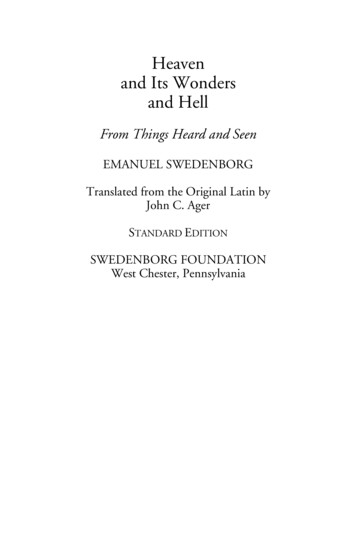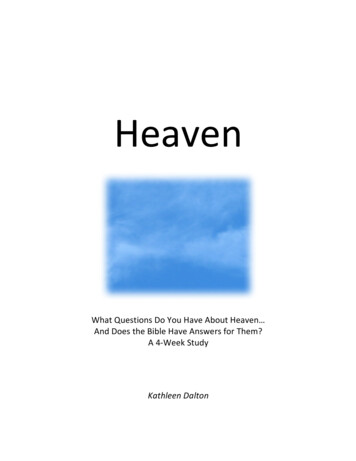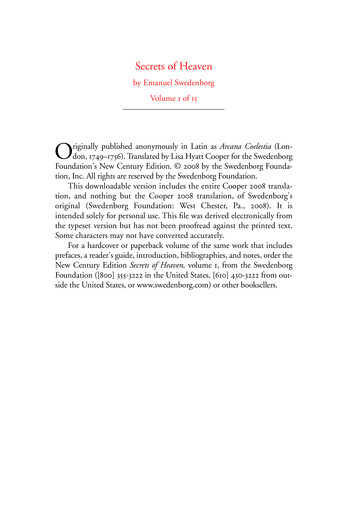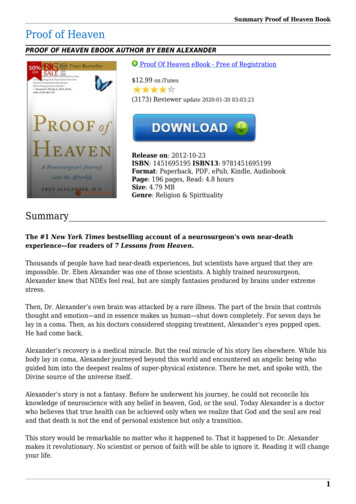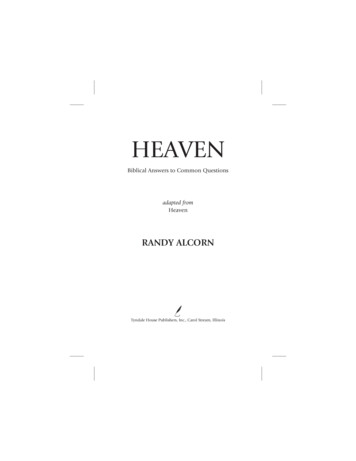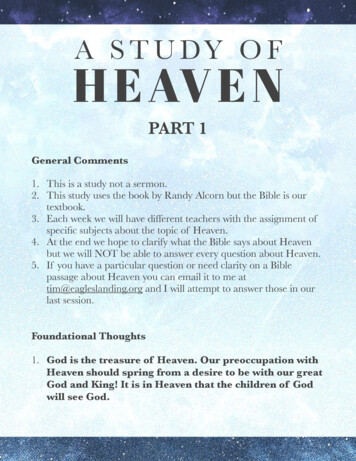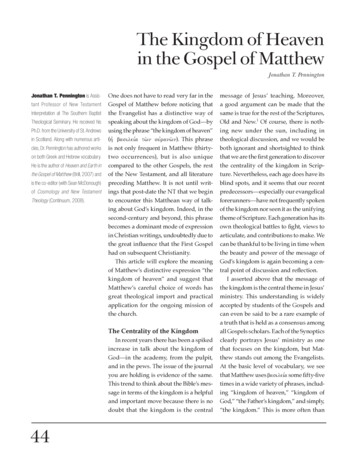
Transcription
The Kingdom of Heavenin the Gospel of MatthewJonathan T. PenningtonJonathan T. Pennington is Assistant Professor of New TestamentInterpretation at The Southern BaptistTheological Seminary. He received hisPh.D. from the University of St. Andrewsin Scotland. Along with numerous articles, Dr. Pennington has authored workson both Greek and Hebrew vocabulary.He is the author of Heaven and Earth inthe Gospel of Matthew (Brill, 2007) andis the co-editor (with Sean McDonough)of Cosmology and New TestamentTheology (Continuum, 2008).One does not have to read very far in theGospel of Matthew before noticing thatthe Evangelist has a distinctive way ofspeaking about the kingdom of God—byusing the phrase “the kingdom of heaven”(h basilei,a tw/ n ou rv anw/ n). This phraseis not only frequent in Matthew (thirtytwo occurrences), but is also uniquecompared to the other Gospels, the restof the New Testament, and all literaturepreceding Matthew. It is not until writings that post-date the NT that we beginto encounter this Matthean way of talking about God’s kingdom. Indeed, in thesecond-century and beyond, this phrasebecomes a dominant mode of expressionin Christian writings, undoubtedly due tothe great influence that the First Gospelhad on subsequent Christianity.This article will explore the meaningof Matthew’s distinctive expression “thekingdom of heaven” and suggest thatMatthew’s careful choice of words hasgreat theological import and practicalapplication for the ongoing mission ofthe church.The Centrality of the KingdomIn recent years there has been a spikedincrease in talk about the kingdom ofGod—in the academy, from the pulpit,and in the pews. The issue of the journalyou are holding is evidence of the same.This trend to think about the Bible’s message in terms of the kingdom is a helpfuland important move because there is nodoubt that the kingdom is the central44message of Jesus’ teaching. Moreover,a good argument can be made that thesame is true for the rest of the Scriptures,Old and New.1 Of course, there is nothing new under the sun, including intheological discussion, and we would beboth ignorant and shortsighted to thinkthat we are the first generation to discoverthe centrality of the kingdom in Scripture. Nevertheless, each age does have itsblind spots, and it seems that our recentpredecessors—especially our evangelicalforerunners—have not frequently spokenof the kingdom nor seen it as the unifyingtheme of Scripture. Each generation has itsown theological battles to fight, views toarticulate, and contributions to make. Wecan be thankful to be living in time whenthe beauty and power of the message ofGod’s kingdom is again becoming a central point of discussion and reflection.I asserted above that the message ofthe kingdom is the central theme in Jesus’ministry. This understanding is widelyaccepted by students of the Gospels andcan even be said to be a rare example ofa truth that is held as a consensus amongall Gospels scholars. Each of the Synopticsclearly portrays Jesus’ ministry as onethat focuses on the kingdom, but Matthew stands out among the Evangelists.At the basic level of vocabulary, we seethat Matthew uses basilei,a some fifty-fivetimes in a wide variety of phrases, including “kingdom of heaven,” “kingdom ofGod,” “the Father’s kingdom,” and simply,“the kingdom.” This is more often than
any of the other Gospels. It is also morefrequent than the rest of the NT documents combined.2 Additionally, we seethat throughout Matthew the kingdomappears at crucial points in the story,such as at the introduction of John theBaptist (3:2) and the beginning of Jesus’ministry (4:17). In both cases, the messagepreached is that the kingdom of heavenis at hand. And when Jesus subsequentlysends his own disciples out they are toldto preach the same message: “As you go,preach, saying, ‘The kingdom of heavenis near.’” (10:7). Similarly, at several ofthe structural seams in Matthew, weencounter another of Matthew’s uniqueand intriguing phrases, “the gospel ofthe kingdom” (4:23; 9:35; 24:14). Additionally, much of Jesus’ teaching repeatsthe kingdom theme. The Beatitudes areframed with reference to the kingdom ofheaven (5:3, 10). Entering the kingdom iswhat Jesus exhorts people to do (5:19-20;7:21; 18:3; 21:31; 23:13). The great Christian prayer—the Lord’s Prayer—has atits heart the request for God’s kingdomto come to earth (6:10). And Jesus givesa whole series of parables in chapter 13(and then again in chapters 20 and 22)which describe what the kingdom is like.The point is clear. Over and over again, ina variety of ways, Matthew (along withhis fellow Evangelists) makes the readeraware of the central message of Jesus: thecoming kingdom of God.The Kingdom of Heaven—Not a Reverential CircumlocutionAs stated above, Matthew’s typicalway of describing the kingdom—as “thekingdom of heaven”—is also unique tohim. Not until sometime later do we findthis expression used in other literature,and often those places are dependent onMatthew. This striking fact has led manyscholars to ask why Matthew speaks inthis unexpected way. The common understanding for at least a century has beenthat Matthew uses “kingdom of heaven”instead of “kingdom of God” out of adesire to avoid using the word “God”—what we might call a reverential circumlocution.3 The argument is that whenone compares Matthew’s use of “kingdom” with the other Synoptic Gospels, itappears that he has simply replaced theoriginal “kingdom of God” sayings withhis favorite “kingdom of heaven.” Thisunderstanding is combined with thefact that there certainly was a tendencyin Judaism to avoid pronouncing andwriting the divine name. This avoidancewas accomplished through a variety oftechniques such as using “divine passive”verb forms and substituting other namesfor God such as “The Name,” “Adonai,”and “The Most High.”I do not have space here to elaborateupon the many problems with this common view, but suffice it to say that thisreverential circumlocution explanationfor Matthew’s “kingdom of heaven”proves indefensible. To put the argumentsuccinctly, it is clear that Matthew is notstudiously avoiding the use of “God”(qe o, j) by employing the phrase h basilei,atw/ n ou vranw/ n because he does indeed use h basilei,a tou/ qeou/ four times (12:28; 19:24;21:31, 43)4 and in fact uses qe o, j freely allthroughout the Gospels (fifty-one times).Additionally, while circumlocutionarytechniques are undoubtedly in use in thefirst century, there is no evidence that“heaven” was being used for this purposeduring that time.5So, if Matthew’s phrase “the kingdomof heaven” is not used simply to avoid theword “God,” then what is its purpose?45
The answer is found in recognizing thatMatthew’s “kingdom of heaven” languageis but one part of an elaborate theme of“heaven and earth” woven all throughout the First Gospel. Recognizing thistheme sheds light on Matthew’s choice tospeak of the kingdom in this unique way,and it also reveals a deep and powerfultheological point—the apocalyptic andeschatological contrast between heavenand earth.The Four-Fold “Heaven and Earth”Theme in MatthewWhen one begins to recognize thelanguage of heaven and “heaven andearth” in Matthew, it is striking to seehow frequent and important this themeis. Not only does Matthew use “heaven”(ou vrano ,j) and “heavenly” (ou vra n, ioj) veryfrequently,6 he employs this language ina variety of key formulas and at crucialpoints in the narrative and teaching discourses. Closer examination reveals thatMatthew develops the theme of “heavenand earth” in four important ways. I willreview these briefly.(1) Singular Versus Plural Pattern ofHeaven (Ouvrano,j)The first way in which Matthew develops the theme of heaven and earth isthrough an intentional use of the word“heaven” with different nuances in thesingular and plural forms. In additionto his frequent use of the word, one ofthe unexpected things about Matthew’semployment of ou vrano ,j is that he prefersto use plural forms of the word over thesingular (fifty-five and twenty-seven,respectively). This may not at first seemodd until one understands that pluralforms of ou vrano ,j are quite rare in ancientGreek, and even in the Greek version of46the Old Testament they are quite uncommon (8 – 9 percent). Plural forms arebecoming more frequent in the time ofthe NT, but they are still not the normalparlance for this word. In fact, Matthew’suses comprise 61 percent of the pluralforms in the NT. Now all of this may stillseem to be irrelevant data or simply coincidence until one begins to see that thereis an intentional pattern at play here. Thatpattern functions in this way: Matthewgenerally uses ou vrano ,j in the singular torefer to the visible (earthly) world and in“heaven and earth” pairs, and he usesthe plural to refer to the invisible (divine)realm. This plural notably includes Matthew’s expressions “kingdom of heaven”and “Father in heaven.” We can beginto see that there is much thought goingon behind Matthew’s use of the word“heaven” and that it hinges on a heavenlyrealm versus earthly realm distinction.(2) Heaven and Earth Pairs“Heaven and earth” is a very importantbiblical phrase, from its first appearance inGen 1:1 throughout to its use at the end ofJohn’s Revelation. Of all the NT authors,no one uses this phrase more often thanMatthew. And he particularly develops itinto a theme in his Gospel. Heaven andearth are connected over twenty times insome form in Matthew. In comparison,Mark has only two instances of the heavenand earth pair and Luke five. Moreover,the language of “heaven and earth” ascontrasting realities is found at the mostimportant theological points throughoutthe Gospel such as in the Lord’s Prayer(6:9-10), the ecclesiological passages(16:17-19; 18:18-19), and the Great Commission (28:18-20). Again, it is not difficult tosee that Matthew is consciously developing a heaven and earth theme.
(3) Father in HeavenAnother common use of heaven language in Matthew is with reference toGod as Father. The fatherhood of God isan important theme in Matthew, and hequite commonly modifies this by attaching heaven to it. Thirteen times we findthe phrase o path .r o e nv [toi/j] ou vranoi/j(“Father in heaven”), and seven times thesimilar o path r. o ou vra n, ioj (“heavenlyFather”). This language is very familiarto us because we as Christians oftenrefer to God as our heavenly Father. Butnotably, in the Gospels “Father in heaven”occurs elsewhere only in Mark 11:25.7 Thisis apparently a particularly Mattheanemphasis. All of this relates to the heavenand earth theme in two ways. First, whenthe noun “heaven” is connected withGod as Father, Matthew always uses theuncommon plural form of ou vrano ,j. This ispart of the singular versus plural patternalready mentioned. Second, references toGod as Father very frequently occur in away that presents a contrast between theFather in heaven and the things on earth(e.g., 23:9).(4) Kingdom of HeavenAs we have already observed, themost common use of heaven in Matthewis in his unique and important phrase“the kingdom of heaven.” In each ofthese thirty-two occurrences the formis always plural (tw/ n ou vranw/ n) and, likethe references to “the Father in heaven,”is part of the singular versus plural pattern observed above. Additionally, closerexamination reveals that many times Matthew uses “kingdom of heaven” as partof a contrast between the heavenly andearthly realms (e.g. 17:24-18:5; 4:1-11).This last observation, combined withall that has been said so far, brings us tothe main point. Analysis of this four-foldusage of heaven language in Matthewshows that there is a consistent and overarching theological point to all of it: Matthew is repeatedly setting up a contrastbetween two realms—the heavenly andthe earthly—which stand for God on theone hand, and humanity on the other.In other words, he is subtly but powerfully weaving into his Gospel narrative thetheme of heaven and earth, particularlyemphasizing the contrast between thesetwo polar realms. Through this four-foldtechnique—singular versus plural formsof ou vrano ,j; heaven and earth pairs, usuallyin contrast; the Father in heaven; and thekingdom of heaven—Matthew is urgingupon us the sense that there is a greatdisjunction between heaven and earth,between God’s way of doing things andours. There is a standing tension betweenthe realms of heaven and earth and thisrepresents the tension between God andhumanity. In this way Matthew is verytypically apocalyptic.The Meaning of theKingdom of HeavenHow does this relate to the meaningof “the kingdom of heaven” in Matthew?Matthew’s choice to describe the kingdom as tw/ n ou vranw/ n (“of heaven,” “fromheaven,” or even “heavenly”) 8 is notmotivated by an avoidance of the divinename but is part of a thoughtful literarypattern with an important theologicalpoint. The in-breaking of the kingdomof God that has come in the Lord Jesus isradically different from the way you and Inaturally think and act and different fromthe way we structure human society. It isunexpected, shocking, and topsy-turvy tohuman sensibilities. The unexpected andradical nature of the kingdom is why Jesus47
spends so much time trying to explainwhat this kingdom from heaven is like(and why people so seldom understand).The Beatitudes give us an image of theblessed ones that is just the opposite ofwhat we would naturally value—theyare the poor in spirit, the persecuted, themourning, the meek. The parables of thekingdom paint for us pictures where debtors are freely forgiven, where the smallestseed produces the largest tree, and wherethe last-come workers receive the samereward. Jesus’ model of life shows openarmed compassion for the downtrodden,the touching of the leper, the exalting ofthe lowly child, the welcoming of the Gentile, and the listening ear for blind outcastbeggars. As King of the universe he entersJerusalem not on a warhorse or goldenchariot but riding humbly on the foal ofa donkey. As king of all he willing ridesinto the city where iron nails will soonbe used to hang him naked on a cross inthe scorching sun. As this king instructsus we learn that the one who wants to befirst should not exercise an overbearingleadership style, but should be the slaveof all. The one who is blessed by God withmaterial wealth should set it aside to follow Christ. The one who desires to savehis life must in fact die. Such is the radicalnature of the vision of the kingdom thatJesus gives.All of this is why it is so powerful andappropriate for Matthew to describe thisas a kingdom tw/ n ou vranw/ n; it is fundamentally different from the kingdoms ofthis world and all human expectations.God’s Coming Kingdom—what Matthewlikes to call the kingdom of heaven—isnot built on human wisdom or humanprinciples, but on God’s character andnature! Matthew has intentionally takenthe cosmological language of heaven and48earth from the OT and has used it tocommunicate the urgently eschatologicalmessage of Jesus. A new day has dawnedwith the coming of the Kingdom. All isoverturned because of the epochal realityof the incarnation, life, death, and resurrection of the Lord Jesus.Theological and PracticalApplication for the ChurchAs fascinating and interesting as thisliterary and theological theme is, wewould be remiss if we did not ask further what the theological and practicalramifications are. This is certainly whatMatthew would want for his readers. Totruly understand the Word is to theologically integrate it and most importantly,to obey it.What did Matthew intend for his hearers to take away from this emphasis onthe contrast between the heavenly andearthly realms? One important observation is how this contrast theme providesa strong critique of all worldly kingdoms.In Matthew’s day this would have meantboth a critique of the Roman Empire andthe contemporary Jewish expectations forthe Messiah’s kingdom. Regarding theapplication to the Roman imperial contextof first-century Judaism (and Christianity), it seems that Matthew is intentionallydrawing on his many connections withthe book of Daniel. In the same way thatDaniel talks about the kingdom of theGod of heaven over against the kingdomof Nebuchadnezzar, Matthew providesan implicit critique of the ruling powerof his own day, the Romans. Matthewand his audience were facing a situationstrikingly similar to the Jewish peopleof the Exilic and post-Exilic times. Theywere a defeated people under the powerof the greatest earthly empire at the time.
Daniel’s language and stories about theGod of heaven and this God’s superiorityover the greatest king of the earth at thetime, Nebuchadnezzar, provide hope andsolace and vision for the Jewish people. Inthe same way, Matthew’s reference to the“kingdom of heaven” (as well as anothersignificant Danielic phrase, the “Son ofMan”) evokes sentiments and encouragement regarding the ultimate superiorityand eschatological hope of the God ofJesus. Thus, Matthew is beautifully andevocatively re-appropriating the visionand hope of Daniel for his own hearers’context, now understood in light of theChrist.At the same time, Matthew critiquesthe common Jewish expectation for God’scoming kingdom. It seems that many Jewsof Jesus’ day were expecting the Messiahto be a military leader who would driveout the heathen (Romans), deliver the Jewsfrom bondage, and establish his Davidickingdom in Jerusalem. Jesus’ model andmessage about God’s coming kingdompatently did not fulfill these expectations.Jesus not only repudiates the use of violence (e.g. 5:5, 9, 39; 26:52), but shockinglyhe heals and welcomes members of theRoman oppressors (e.g. 8:5-12). So, whilethe message about God’s kingdom doesprovide solace for those suffering underoppression, its message is one of humility,meekness, cheek-turning, and waiting.This is not what most Jews expected orwanted.Related, another clear function ofMatthew’s heaven and earth contrasttheme is to provide a clear identity forthe followers of Jesus. Matthew wantshis hearers to understand that those whofollow Christ are the true people of Godand to encourage them with this reality.Jesus defines this new or true people notby ethnic pedigree, including havingAbraham as one’s father (3:9-10; 8:11-12;23:9), nor by positions of honor (23:2-11),but as those who do the will of the Fatherwho is in heaven (7:21; 12:50), as thosewhose lives bear the fruit of followingGod’s commands from the heart (3:7-10;7:15-23; 12:33-38). This theme creates aheaven-oriented identity for the disciplesin the midst of a hostile earthly world. Theworld is depicted as bipartite—heavenand earth—and Jesus’ disciples are thetrue people of God aligned with heaven,as opposed to the rulers (Roman andJewish) on earth. In this way, Matthew’sheaven and earth theme is an importantpart of his ecclesiology (see esp. 16:17-19;18:14-20).A third theological function of theheaven and earth theme is to undergirdthe radical nature of the ethics andteachings of Jesus. Jesus’ teachings andparables have a clear ring about themof challenge, urgency, and world-overturning realities. This is true nowheremore than in Matthew’s Sermon on theMount. The followers of Jesus are calledto live now with a God-hoping ethicalstandard that is counter-intuitive andcounter-cultural. Mourners, the poor,the persecuted, and the meek are saidto blessed (5:3-5, 10-12). The standard ofrighteousness that Jesus requires mustgo beyond even the strictest interpretations of the scribes and Pharisees (5:20):it must cut to the level of the heart. Statednegatively, hating your brother is murder(5:21-26), and looking lustfully is adultery(5:27-30). Stated positively, instead ofretaliation, the response should be gracious giving (5:38-42); instead of lovingonly one’s neighbor, the disciples mustlove and pray for their enemies (5:43-47).The disciples’ piety must be done from49
the heart and not from hypocrisy—as inthe cases of almsgiving, prayer, and fasting (6:1-21). In short, God’s standard ofrighteousness as proclaimed by Jesus isperfection, for single-heartedness in thevery same way that the Father himselfis perfect (5:48). The radical nature of allsuch teachings is clearly seen and felt byany hearer. I suggest that the pervasiveheaven and earth theme (which is itselfconcentrated in the Sermon) undergirdsthese radical teachings by positing theways of God against the ways of humanity. That is, Jesus is presented as callingdisciples to align themselves with thekingdom of heaven, as calling them to besons of the Father in heaven (5:44-45; 7:21;12:50), as calling them to lay up treasuresin heaven and not on earth (6:19-21), ascalling them to pray and hope for thekingdom of heaven to come to earth (6:9-10).This constant refrain of the tension or current disjuncture between the two realmsof heaven and earth provides a tangiblevision for the kind of hope that transformsdaily living.9 To use Bauckham and Hart’slanguage, it provides resources for theChristian imagination which give Godward hope.10 This heaven and earth disjunction is reminiscent of the same pointin several of Paul’s exhortations to godlyliving.11 In Matthew, this way of speakingprovides the framework of a symbolicuniverse that encourages the disciples toalign themselves within the world witha different vision and set of values. Onlythis can sustain such a radical ethical callas Matthew presents. At the core of thisvision is the heaven and earth theme.ConclusionIn sum, there is great literary, theological, and pastoral weight to Matthew’schoice to depict the proclamation of Christ50as about the “kingdom of heaven.” Withgreat skill and finesse Matthew has wovena comprehensive narrative account ofJesus’ life and teachings. This account isfull of memorable images and language,including the widespread theme ofheaven and earth. Understanding thistheme enables one to perceive the meaning and function of Matthew’s uniquephrase “kingdom of heaven.” While thisexpression denotes the same thing as the“kingdom of God,” it connotes many otherthings. Particularly, we sense that God’s(heavenly) ordering of life and society isradically different than the ways of sinful earth. Now that the new creation ornew genesis (see Matt 19:28) has dawnedthrough Christ, those who follow Jesusmust align themselves with this comingradical heavenly kingdom. And as wedo so, we stand to inherit the greatestreward, God’s presence through Christ(cf. Matt 1:23; 28:20). In this time of waitingand hoping, the Christian’s stance can besummed up in the great prayer that Jesusteaches his disciples to pray: “Let yourname be sanctified, let your kingdomcome, let your will be done on earth evenas it is in heaven” (Matt 6:9-10).ENDNOTESThere are several valuable books thatcould be consulted on this matter. Formany, a good place to start is VaughanRoberts, God’s Big Picture (DownersGrove: InterVarsity, 2002). Slightly longer and more comprehensive is CraigBartholomew and Michael Goheen’s TheDrama of Scripture (Grand Rapids: Baker,2004). Closely related to this latter workis the excellent and paradigm-shiftingbook by Al Wolters, entitled, CreationRegained (2d ed.; Grand Rapids: Eerdmans, 2005).1
Of course, there are many otherways in which the kingdom themeis communicated beyond simply theuse of basilei,a. These include references to Jesus as king (basileu/ j),actions that depict God’s comingreign, and texts that allude to OTimages of God’s kingship (e.g., Isa40:1-12). Again, Matthew employssuch language at least as frequentlyas the other Evangelists and oftenmore.3The only other popular view wasthat of the classical Dispensationalists. They argued that there is atemporal difference in meaningbetween “kingdom of God” and“kingdom of heaven.” This viewproves quite untenable biblicallyand has since been abandoned bymost modern (“progressive”) Dispensationalists.2Some manuscripts also have "kingdom of God" at 6:33, but the originalwas almost certainly only "kingdom." Inexplicably the ESV includesthe whole phrase even though thecritical editions of the Greek NewTestament do not recommend it (nordoes the RSV have it).5This is necessarily a very briefoverview of the argument. A fullexploration of the issue and documentation can be found in myHeaven and Earth in the Gospel ofMatthew (Leiden: Brill, 2007), 13-37.This whole article is a concise explanation of the main idea in this book,and I would refer the reader to thatvolume for more information on allthe following arguments.6Ou vrano ,j occurs eighty-two times inMatthew (30 percent of all the NToccurrences) and ou rv a n, ioj seven4times.Mk 11:25 is parallel to one of Matthew’s occurrences of o path .r u m w/ no ou vra n, ioj (6:14). Who is dependenton whom is unclear. There is alsothe less exact parallel o path .r Îo Ð̀e xv ou vranou/ in Luke 11:13, which incontext is best understood as a reference to the Father giving the HolySpirit from heaven.8These three translations are allpotentially good glosses for thegenitive phrase here. Indeed, weare not forced to choose only oneand dismiss the others. As manyscholars have observed, there ismuch ambiguity with regard tothe Greek genitive and often morethan one category is appropriate.Cf. Nigel Turner, Syntax (vol. 3 ofA Grammar of New Testament Greek,ed. James Hope Moulton; Edinburgh: T. & T. Clark, 1963), 210;Maximilian Zerwick, Biblical Greek(trans. Joseph Smith; Rome: Pontifical Biblical Institute, 1963), §25;Herbert Weir Smyth, Greek Grammar(rev. Gordon M. Messing; Cambridge: Harvard University Press,1984), §1295.9This corresponds closely with theinterpretation of heaven languagein Matthew offered by Robert Foster. Foster states that the “heavenlylanguage” of the Sermon “purposefully centres the lives of Matthew’scommunity on the reality thatcounts: heaven’s reality. Sociologically, the language of heavenencourages the disciples to continuein their counter-cultural lifestyle asthey are assured that the FH [Fatherin heaven] cares about their earthlystruggles and needs and will give7them a heavenly reward. . . . Theologically, this language guides thecommunity’s decisions as they looktoward heaven for their standardof righteousness, their strengthfor holy living, and their rewardfor their labours.” Robert Foster,“Why on Earth Use ‘Kingdom ofHeaven’?: Matthew’s TerminologyRevisited,” New Testament Studies48 (2002): 487-99.10Bauc k ha m a nd Ha r t g ive a nexcellent account of how a grandChristian vision (via imagination)re-sources the Christian life in Richard Bauckham and Trevor Hart,Hope Against Hope: Christian Eschatology at the Turn of the Millennium(Grand Rapids: Eerdmans, 1999).I suggest that Matthew’s vision ofthe world now and in the eschaton,described regularly with referenceto heaven and earth, provides thekind of imaginative vision Bauckham and Hart are describing.11For example, Col 3:1-4 makes thebasis for godliness the fact that thebeliever has been raised up withChrist, therefore his or her mindshould be set on “things above,not on the things that are on theearth.” This is followed by theexhortation: “Put to death thereforewhat is earthly in you: fornication,impurity, passion, evil desire, andcovetousness, which is idolatry”(3:5). Cf. Eph 1:19-20; 2:5-6.51
cles, Dr. Pennington has authored works on both Greek and Hebrew vocabulary. He is the author of Heaven and Earth in the Gospel of Matthew (Brill, 2007) and is the co-editor (with Sean McDonough) of Cosmology and New Testament Theology (Continuum, 2008). One does not have to read very far in the Gospel of Matthew before noticing that


